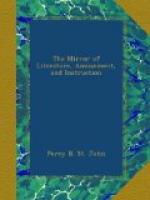Would you then sleep tranquilly after your meal, and never fear those dreams which are so fatal to gourmands, quaff your coffee; it will fall like dew upon your lips, and sweetly temper with all those juices which oppress your exhausted stomach. If you can, drink your coffee without sugar, for then it preserves its natural flavour, and is much more efficacious than when mixed with other ingredients. Laugh at the doctors who tell you that hot coffee irritates the stomach and injures the nerves; tell them that Voltaire, Fontenelle, Stacey, and Fourcroy, who were great coffee-drinkers, lived to a good old age.
The brochure, for such it is, is wound up with “the natural history of coffee,” and an appendix of “English receipts,” &c.
* * * * *
PERILS OF THE WAR OF INDEPENDENCE IN SOUTH AMERICA.
A work of extraordinary and soul-stirring interest has lately appeared on the Revolutions of South America. It is entitled “Memoirs of General Miller, in the Service of the Republic of Peru,” and is compiled from private letters, journals, and recollections, by the brother of the general. From this portion of the work we gather that William Miller, the companion in arms of San Martin and Bolivar, was born in Kent, in 1795. He served with the British army in Spain and America, from 1811 till the peace of 1815. In 1816 and 1817, he devoted some attention to mercantile affairs; but being of an ardent spirit he finally resolved to engage as a candidate for military honour in the struggle in South America. Colombia was overrun with adventurers; and Miller directed his course to the river La Plata. He left England in August, 1817, when he was under twenty-two years of age, and landed at Buenos Ayres in the September following. In a month after, he received a captain’s commission in the army of the Andes. In the beginning of 1818, captain Miller set out for the army of San Martin, and crossed the Andes by the pass of Uspallata. He soon joined his companions in arms. His first military enterprise was unsuccessful, but a notice of it will give our readers a faint idea of the perils of a campaign in the mountainous regions of South America. Miller, it appears, was on his march towards the capital of Chile; the artillery consisted of ten six-pounders, to this branch of the service his attention was, of course, devoted. The incident occurred in crossing the Maypo, a torrent which rushes from a gorge of the Andes.
The only bridge over it is made of what may be called hide cables. It is about two hundred and fifty feet long, and just wide enough to admit a carriage. It is upon the principle of suspension, and constructed where the banks of the river are so bold as to furnish natural piers. The figure of the bridge is nearly that of an inverted arch. Formed of elastic materials, it rocks a good deal when passengers go over it.




